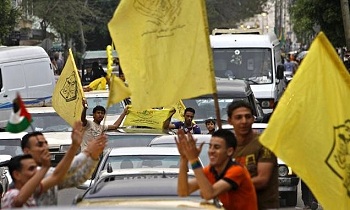'If you choose unity with Hamas, we'll choke you'
Khalid Amayreh in occupied Jerusalem
Al-Ahram Weekly

Predictably, Israel is using financial blackmail in an attempt to snub out Palestinian national reconciliation and unity
The extreme rightwing government of Israel is carrying out threats to financially scuttle the Palestinian Authority (PA) for daring to restore national unity with Hamas.
Israeli leaders are worried Palestinian national unity will strengthen the overall Palestinian stance vis-à-vis Israel and might expedite international recognition of a prospective Palestinian state.
Israel has refused to transfer to PA coffers an estimated $100 million in tax and customs revenue, which Israel collects on the Palestinians' behalf. Israel receives administration and other fees for collecting the money that the PA government uses to pay salaries for tens of thousands of civil servants.
Consequently, the PA has so far not been able to pay salaries for April. This is already generating discontent within the Palestinian community. Some Palestinian political leaders have urged the PA to respond stringently to Israel's draconian measures by suspending or ending security coordination with Israel.
Israel and its guardian ally, the United States, view the continuation of security coordination between Israel and the PA as a sine qua non for the existence and survival of the PA as well as for the continuation of any semblance of peace efforts in the region.
However, with a growing feeling among Palestinians, including Fatah supporters, that Israel is effectively blackmailing the Palestinian leadership, some prominent Palestine Liberation Organisation (PLO) leaders and officials have voiced exasperation at the Israeli behaviour.
"Look, we are not seeking money from Israel, which murders our children and is occupying our land. We are demanding our own money. So Israel is not really doing any favour to us by transferring these monies," said Abbas Zaki, a leading Fatah figure in the West Bank.
"If Israel thinks that by withholding the transfer of our money we will surrender and succumb to its impossible demands, it is mistaken. This won't happen because, if necessary, we will rock the whole boat and bring the temple down on everybody's head."
PA Prime Minister Salam Fayyad told reporters in Ramallah this week that the Israeli decision to freeze Palestinian funds was putting the Ramallah government in a very difficult financial situation.
He said the PA paid salaries to its 150,000 employees promptly on the 5th of each month, adding that "now is the 9th of May, and we have not been able to meet that obligation."
A certain solace seems to have come from the European Union, which is less affected by pressure exerted by Jewish lobbies and other pro-Zionist circles in comparison to the United States. The EU reportedly has agreed to grant the PA the sum of $85 million, which would help the Ramallah government pay overdue salaries.
However, even this solace is going to be temporary and have a short lasting effect as the same problem will reappear and might even exacerbate next month. This, PA officials say, will necessitate the adoption of political measures that would extricate the PA from a situation where it is tightly held hostage to Israeli whims and blackmailing tactics.
"This situation is unacceptable. It could cause a real implosion or explosion. The Europeans, the Americans and all those concerned ought to take note of this," warned Ghassan Khatib, head of the government's press office in Ramallah.
"They are telling us either you have civil war and internal fighting or we will choke you and make your life an enduring hell. No dignified people under the sun would accept this kind of blackmail, and we are a dignified people."
The Israeli decision has drawn less than angry reactions from the US administration but unreserved support from the excessively pro-Israeli US Congress.
Refraining from using strong epithets to denounce the Israeli decision, the US State Department described the withholding of funds from the PA as merely "premature".
Deputy spokesman Mark Toner admitted that the Israelis "have their own government's position" and that "we believe that we need to wait and see. We believe it's important that the Palestinians ensure the implementations of the reconciliation agreement in a way that advances the peace process."
"We are looking to see what this reconciliation agreement looks like in practical terms before we make any decisions about future assistance," Toner added.
The Obama administration hinted that the warnings of some members of Congress to cut financial aid to the PA following reconciliation with Hamas would not be constructive.
"We understand these concerns, and I would just say, as the new Palestinian government's formed, we'll assess it based on its policies and we'll determine the implications for our assistance," Toner said, adding that training the Palestinian police force was "worthwhile" as "they are an effective force and they have made significant gains in providing security" for Israel .
Israel is adopting a conspicuously opportunistic and hypocritical attitude towards Palestinian reconciliation. Prior to the conclusion of the reconciliation agreement in Cairo last week, Israeli leaders and officials complained that Israel could not make peace with a divided people and that PA Chairman Mahmoud Abbas had only partial authority over his people.
Meanwhile, one of the main terms of the reconciliation agreement states that calm with Israel is to be maintained with the consent of all Palestinian factions, including Fatah and Hamas.
However, Israel is worried that the inclusion of Hamas into the mainstream Palestinian leadership would radicalise the overall Palestinian stance and thwart Israel's efforts to wrest far-reaching concessions from the PLO, especially concessions pertaining to such fundamental issues as the refugees and Jerusalem.
Meanwhile, Israeli President Shimon Peres suggested that a "line of communication" should be opened with Hamas. "We shouldn't be overly concerned about the name or title of our interlocutors on the Palestinian side. We encountered the same problem when we first started talking to [late PLO leader Yasser] Arafat. Many argued then, how could we talk to a terrorist organisation?"
Peres argued that the creation of Palestinian statehood would have to be coupled with concrete security guarantees for Israel. "I have also said this to the UN secretary-general. I asked him, 'Sir, you want to take a decision for a Palestinian state? Can you stop the terrorism? Can you stop the gunfire? Can you stop the incitement?"
Peres ignored that fact that Palestinian "terrorism, gunfire and incitement" has, in the overwhelming majority of cases, come as a desperate and less-than-proportionate reaction to far-greater Israeli terrorism, gunfire and provocations.
According to a recent UN report, Israel murdered as many as 1300 Palestinian children since 2000. During the same period, less than two or three-dozen Israeli children were killed by Palestinian fire.
However, it is important to keep in mind that Peres, a co- engineer of the Oslo Accords, which were vehemently rejected by the Likud Party and its current head, Prime Minister Binyamin Netanyahu, represents a small and diminishing minority in Israel as the bulk of Israeli Jewish society continues to drift towards jingoism and fanaticism.
___________________________________________________________________________________
Khalid Amayreh (Arabic: خالد عمايرة, b. 1957 Hebron) is a Palestinian journalist based in Dura, near Hebron. Amayreh has experienced years of restrictions on his activities and travel, including imprisonment. Some of his many articled can be found here: http://www.xpis.ps/
Amayreh has been a correspondent with numerous newspapers and news outlets:
● Sharja TV, correspondent, 1994-2001
● Iranian News Agency (IRNA), 1995-2006
● Middle East International (London) 1995-2003
● Al-Ahram Weekly (English) 1997-present
● Aljazeera English (aljazeera.net): 2003-2006
● Palestine Information Center: 2000-present.
● Palestine Times (daily newspaper) (has ceased publication)
Furthermore he is a prolific freelance writer contributing to many websites, e.g., The Palestinian Information Center, The People's Voice, PalestineThinkTank, Uprooted Palestinians and Al-Ahram Weekly.
Books
● Journalism and Mass communication, Theory and Practice (Arabic, 1996)
● Refutation of Western Myths and Misconceptions about Islam and the Palestinian question (Arabic, 1988)
● Living Under the Israeli Occupation, (Forthcoming)
Resources
List of Amayreh's articles in French
List of Amayreh's articles in Spanish
[Information gleaned from Wikipedia and PIWP Database]
___________________________________________________________________________________
Photo: Associated Press
URL: http://www.a-w-i-p.com/index.php/2011/05/13/if-you-choose-unity-with-hamas-we-ll-cho

























